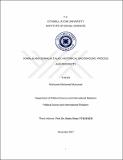DSpace Repository
SOMALILAND-SOMALIA TALKS: HISTORICAL BACKGROUND, PROCESS AND PROSPECTS
JavaScript is disabled for your browser. Some features of this site may not work without it.
| dc.contributor.author | Muhumed, Muhumed Mohamed
|
|
| dc.date.accessioned | 2019-05-27T07:20:56Z | |
| dc.date.available | 2019-05-27T07:20:56Z | |
| dc.date.issued | 2017 | |
| dc.identifier.uri | http://hdl.handle.net/11547/2229 | |
| dc.description.abstract | Devletler ve devlet dışı aktörler arasındaki görüşmeler çoğunlukla ayrılma görüşmeleri veya barış görüşmeleridir (çatışma çözümü). İki devlet ister birleşmiş ister ki ayrı olsun ayrılma görüşmelerinin amacı iki bölgenin gelecekteki ilişkilerini belirlemektir. Üstelik Müzakereler, yeni devletleri tanıma sürecinde çok önemli bir rol oynamaktadır. Yeni seçilen ve sonra uluslararası alanda tanınan devletlerin çoğu bu konumu diyalog yoluyla gerçekleştirir. Bu tez, Somalil Hükümeti ile Somali Federal Hükümeti arasında 2012'deki Londra'da başlayan ve 2015'te İstanbul'da çöken diyalog sürecini inceliyor. Eski Somaliland İngiliz Himaye ve eski İtalyan Somaliland (İtalyan Somaliland, BM Mandalı İtalyan Vesayetçiliği altında) Somali Cumhuriyeti'ni oluşturan böylece sırasıyla Temmuz 1960 26 Haziran ve 1 günü İngiltere ve İtalya'dan bağımsızlıklarını kazanan ve sonrasında 1 Temmuz 1960 tarihinde birleşmiş. 30 yıllık bir birlikten sonra 1991'de Somali merkezi hükümeti çöktü silahlı isyancı gruplar, acımasız bir iç savaş sonrasında, eski askeri diktatör Mohamed Siad Barre'yi devirdi. Sonuç olarak, Somaliland 18 Mayıs 1991'de Somali'den ayrılacağını açıkladı ve o zamandan beri iki ülke ayrı. 2012 Londra Somali Konferansı'ndan bu yana Londra, Dubai, Ankara, İstanbul (iki kez) ve Cibuti'de altı tur görüşme gerçekleşti. Ancak, yedinci tur (İstanbul III) Ocak 2015'te başarısız oldu ve ardından tüm diyalog sürecinin çökmesi izlendi. Müzakerelerin çökmesine yol açan etkenler, uzak siyasi konumlar, iç ve dış baskılar, önceki anlaşmaların uygulanamamış olması ve başvurulmamış şikayet ve adaletsizlikleri içermektedir. | tr_TR |
| dc.language.iso | tr | tr_TR |
| dc.publisher | ISTANBUL AYDIN UNIVERSITY INSTITUTE OF SOCIAL SCIENCES | tr_TR |
| dc.subject | Müzakereler | tr_TR |
| dc.subject | Görüşmeler | tr_TR |
| dc.subject | Diyalog | tr_TR |
| dc.subject | Ayrılma görüşmeleri | tr_TR |
| dc.subject | Somaliland | tr_TR |
| dc.subject | Somali | tr_TR |
| dc.subject | Talks | tr_TR |
| dc.subject | Negotiations | tr_TR |
| dc.subject | Dialogue | tr_TR |
| dc.subject | Secession talks | tr_TR |
| dc.subject | Somaliland | tr_TR |
| dc.subject | Somalia | tr_TR |
| dc.title | SOMALILAND-SOMALIA TALKS: HISTORICAL BACKGROUND, PROCESS AND PROSPECTS | tr_TR |
| dc.type | Thesis | tr_TR |
| dc.description.abstractol | Talks among states or among states and non-state actors are mainly secession talks or peace talks (conflict resolution). The purpose of the secession talks is to determine the future relations of two territories – whether they will stay united or separate into two states. Moreover, Negotiations are a crucial part in the process of recognizing new states. Most of the newly seceded, and then, internationally recognized states achieved this position through dialogue. This thesis examines the dialogue process between the Government of Somaliland and the Federal Government of Somalia that started in London in 2012 and collapsed in Istanbul in 2015. The former Somaliland British Protectorate and the former Italian Somaliland united on 1 July 1960, after gaining their independence from Britain and Italy (Italian Somaliland being under UN Mandated Italian Trusteeship) on 26 June and 1 July 1960, respectively, and thus forming the Somali Republic. After a 30-year long union, the central government of Somalia collapsed in 1991, when armed rebel groups, after a brutal civil war, ousted the late military dictator Mohamed Siad Barre. Consequently, Somaliland announced its secession from Somalia on 18 May 1991, and the two countries were separate ever since. Since the 2012 London Conference on Somalia, six round talks took place in London, Dubai, Ankara, Istanbul (twice) and Djibouti. However, the seventh round (Istanbul III) failed in January 2015 and then, the collapse of the entire dialogue process followed. The factors that led to the collapse of the talks include distant political positions, domestic and external pressure, lack of implementation of the previous agreements and unaddressed grievances and injustices. | tr_TR |
| dc.publisher.firstpagenumber | 1 | tr_TR |
| dc.publisher.lastpagenumber | 69 | tr_TR |
Files in this item
This item appears in the following Collection(s)
-
Tezler -- Thesis [3470]
